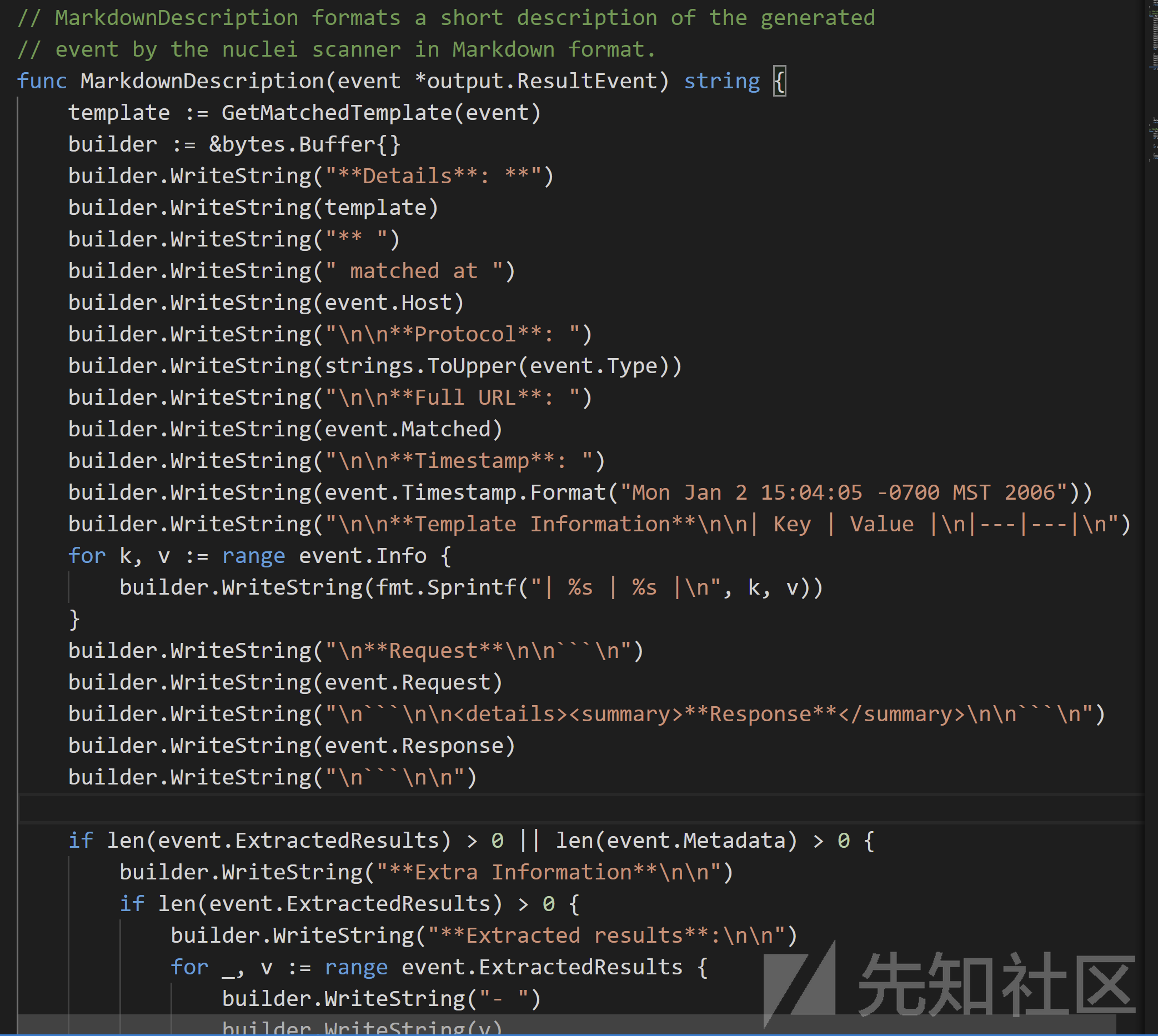简介
Nuclei is a fast tool for configurable targeted vulnerability scanning based on templates offering massive extensibility and ease of use.
和以前基于python的POC-T类似,不过它是用Go编写,并且基于yaml编写模板。
这类的工具挺多的,流程也都大同小异,重要的想让人使用的动力,主要还是来自于生态吧。
nuclei基于社区提供了很多可以白嫖的模板,本着这一点,本文就是记录一下如何在自己扫描器中调用nuclei的模板,以及记录一些有趣的、以及以后可能也会用到的技术细节。
有趣的细节
相同的请求
相同的请求可以合并,就不需要发送两次啦
v2\pkg\protocols\http\cluster.go
package http
import (
"github.com/projectdiscovery/nuclei/v2/pkg/protocols/common/compare"
)
// CanCluster returns true if the request can be clustered.
//
// This used by the clustering engine to decide whether two requests
// are similar enough to be considered one and can be checked by
// just adding the matcher/extractors for the request and the correct IDs.
func (r *Request) CanCluster(other *Request) bool {
if len(r.Payloads) > 0 || len(r.Raw) > 0 || len(r.Body) > 0 || r.Unsafe {
return false
}
if r.Method != other.Method ||
r.MaxRedirects != other.MaxRedirects ||
r.CookieReuse != other.CookieReuse ||
r.Redirects != other.Redirects {
return false
}
if !compare.StringSlice(r.Path, other.Path) {
return false
}
if !compare.StringMap(r.Headers, other.Headers) {
return false
}
return true
}
- 比较模板请求中的method,最大重定向数,是否共享cookie请求,是否重定向
- 比较请求的path
- 比较请求的header
compare的细节函数
package compare
import "strings"
// StringSlice 比较两个字符串切片是否相等
func StringSlice(a, b []string) bool {
// If one is nil, the other must also be nil.
if (a == nil) != (b == nil) {
return false
}
if len(a) != len(b) {
return false
}
for i := range a {
if !strings.EqualFold(a[i], b[i]) {
return false
}
}
return true
}
// StringMap 比较两个字符串map是否相同
func StringMap(a, b map[string]string) bool {
// If one is nil, the other must also be nil.
if (a == nil) != (b == nil) {
return false
}
if len(a) != len(b) {
return false
}
for k, v := range a {
if w, ok := b[k]; !ok || !strings.EqualFold(v, w) {
return false
}
}
return true
}
client报告
nuclei支持github、gitlab、jira、markdown好几种报告模式,刚开始以为是只报告bug呢,后面知道,发现新的结果也会报告的。
看一下生成markdown的描述

报告的细节很详细,请求细节和返回细节都会报告出来。
headless模拟
nuclei的最新版本支持基于chromium的headless访问,用于直接模拟浏览器访问,在v2\pkg\protocols\headless
使用的库是https://github.com/go-rod/rod
我看源码结构里面定义了很多事件,后面应该是想基于yaml来模拟操作浏览器吧?
没有细看实现的完整度有多少,如果这个实现了,就太厉害了 - =
interface转换
go类型中的interface可以看成是任意类型,但是在使用时需要将他转换成我们指定的类型,nuclei实现了这个方法。未来可能也会用到记录下。
// Taken from https://github.com/spf13/cast.
package types
import (
"fmt"
"strconv"
"strings"
)
// ToString converts an interface to string in a quick way
func ToString(data interface{}) string {
switch s := data.(type) {
case nil:
return ""
case string:
return s
case bool:
return strconv.FormatBool(s)
case float64:
return strconv.FormatFloat(s, 'f', -1, 64)
case float32:
return strconv.FormatFloat(float64(s), 'f', -1, 32)
case int:
return strconv.Itoa(s)
case int64:
return strconv.FormatInt(s, 10)
case int32:
return strconv.Itoa(int(s))
case int16:
return strconv.FormatInt(int64(s), 10)
case int8:
return strconv.FormatInt(int64(s), 10)
case uint:
return strconv.FormatUint(uint64(s), 10)
case uint64:
return strconv.FormatUint(s, 10)
case uint32:
return strconv.FormatUint(uint64(s), 10)
case uint16:
return strconv.FormatUint(uint64(s), 10)
case uint8:
return strconv.FormatUint(uint64(s), 10)
case []byte:
return string(s)
case fmt.Stringer:
return s.String()
case error:
return s.Error()
default:
return fmt.Sprintf("%v", data)
}
}
// ToStringSlice casts an interface to a []string type.
func ToStringSlice(i interface{}) []string {
var a []string
switch v := i.(type) {
case []interface{}:
for _, u := range v {
a = append(a, ToString(u))
}
return a
case []string:
return v
case string:
return strings.Fields(v)
case interface{}:
return []string{ToString(v)}
default:
return nil
}
}
// ToStringMap casts an interface to a map[string]interface{} type.
func ToStringMap(i interface{}) map[string]interface{} {
var m = map[string]interface{}{}
switch v := i.(type) {
case map[interface{}]interface{}:
for k, val := range v {
m[ToString(k)] = val
}
return m
case map[string]interface{}:
return v
default:
return nil
}
}
DSL语法
nuclei的模板语法支持很多静态的匹配条件,regx,word等等,同时也引入了dsl语法,让静态的yaml文件具备了调用函数的特性。
一个nuclei模板
id: CVE-2018-18069
info:
name: Wordpress unauthenticated stored xss
author: nadino
severity: medium
description: process_forms in the WPML (aka sitepress-multilingual-cms) plugin through 3.6.3 for WordPress has XSS via any locale_file_name_ parameter (such as locale_file_name_en) in an authenticated theme-localization.php request to wp-admin/admin.php.
tags: cve,cve2018,wordpress,xss
requests:
- method: POST
path:
- "{{BaseURL}}/wp-admin/admin.php"
body: 'icl_post_action=save_theme_localization&locale_file_name_en=EN\"><html xmlns=\"hacked'
matchers:
- type: dsl
dsl:
- 'status_code==302 && contains(set_cookie, "_icl_current_admin_language")'
可以看到dsl是一个表达式。
v2\pkg\operators\common\dsl\dsl.go 展现了实现dsl语法的函数细节

匹配模式

识别不同的类型进行不同类型的规则匹配
nuclei使用的是https://github.com/Knetic/govaluate 这个库,上面有基本用法
expression, err := govaluate.NewEvaluableExpression("(mem_used / total_mem) * 100");
parameters := make(map[string]interface{}, 8)
parameters["total_mem"] = 1024;
parameters["mem_used"] = 512;
result, err := expression.Evaluate(parameters);
// result is now set to "50.0", the float64 value.
这个库已经3年没有更新了。后面我在用这个库的时候发现一个bug。。就是dsl的函数参数会与自带的语法冲突,官方方案是使用转义,但是这个对于dsl的人来说太痛苦,连-都要转义是什么滋味?
后面我fork了一份解决了,在使用参数的时候不用管转义的问题了。
https://github.com/boy-hack/govaluate
官方太久没更新,所以也没提pull request
projectfile
projectfile是nuclei提供了可以保存项目的选项。
内部实现是通过一个map保存了所有请求的包以及返回结果,key是对请求体(request struct)序列化后进行sha256运算。
再次读取时初始化这个就好了,其中用到了gob对数据结构进行序列化和反序列化操作。
v2\pkg\projectfile\httputil.go
package projectfile
import (
"bytes"
"crypto/sha256"
"encoding/gob"
"encoding/hex"
"io"
"io/ioutil"
"net/http"
)
func hash(v interface{}) (string, error) {
data, err := marshal(v)
if err != nil {
return "", err
}
sh := sha256.New()
_, err = io.WriteString(sh, string(data))
if err != nil {
return "", err
}
return hex.EncodeToString(sh.Sum(nil)), nil
}
func marshal(data interface{}) ([]byte, error) {
var b bytes.Buffer
enc := gob.NewEncoder(&b)
err := enc.Encode(data)
if err != nil {
return nil, err
}
return b.Bytes(), nil
}
func unmarshal(data []byte, obj interface{}) error {
dec := gob.NewDecoder(bytes.NewBuffer(data))
err := dec.Decode(obj)
if err != nil {
return err
}
return nil
}
type HTTPRecord struct {
Request []byte
Response *InternalResponse
}
type InternalRequest struct {
Target string
HTTPMajor int
HTTPMinor int
Method string
Headers map[string][]string
Body []byte
}
type InternalResponse struct {
HTTPMajor int
HTTPMinor int
StatusCode int
StatusReason string
Headers map[string][]string
Body []byte
}
// Unused
// func newInternalRequest() *InternalRequest {
// return &InternalRequest{
// Headers: make(map[string][]string),
// }
// }
func newInternalResponse() *InternalResponse {
return &InternalResponse{
Headers: make(map[string][]string),
}
}
// Unused
// func toInternalRequest(req *http.Request, target string, body []byte) *InternalRequest {
// intReq := newInternalRquest()
// intReq.Target = target
// intReq.HTTPMajor = req.ProtoMajor
// intReq.HTTPMinor = req.ProtoMinor
// for k, v := range req.Header {
// intReq.Headers[k] = v
// }
// intReq.Headers = req.Header
// intReq.Method = req.Method
// intReq.Body = body
// return intReq
// }
func toInternalResponse(resp *http.Response, body []byte) *InternalResponse {
intResp := newInternalResponse()
intResp.HTTPMajor = resp.ProtoMajor
intResp.HTTPMinor = resp.ProtoMinor
intResp.StatusCode = resp.StatusCode
intResp.StatusReason = resp.Status
for k, v := range resp.Header {
intResp.Headers[k] = v
}
intResp.Body = body
return intResp
}
func fromInternalResponse(intResp *InternalResponse) *http.Response {
var contentLength int64
if intResp.Body != nil {
contentLength = int64(len(intResp.Body))
}
return &http.Response{
ProtoMinor: intResp.HTTPMinor,
ProtoMajor: intResp.HTTPMajor,
Status: intResp.StatusReason,
StatusCode: intResp.StatusCode,
Header: intResp.Headers,
ContentLength: contentLength,
Body: ioutil.NopCloser(bytes.NewReader(intResp.Body)),
}
}
// Unused
// func fromInternalRequest(intReq *InternalRequest) *http.Request {
// return &http.Request{
// ProtoMinor: intReq.HTTPMinor,
// ProtoMajor: intReq.HTTPMajor,
// Header: intReq.Headers,
// ContentLength: int64(len(intReq.Body)),
// Body: ioutil.NopCloser(bytes.NewReader(intReq.Body)),
// }
// }
集成nuclei
为了白嫖nuclei的poc,我们准备在自己的扫描器中集成nuclei,或者兼容它的语法。
以前版本想这么做,要深入到很底层的代码去改(因为很多底层接口都是内部的,外部提供的参数我们不需要),一个文件一个文件去扣,很麻烦。
新版的nuclei好多了,不仅包结构调整为go包的形式,很多类都是interface类型,我们只需要根据interface实现那几个函数就能模拟一个mock的类传入。
而且nuclei的测试用例页提供了参考,如果也想调用nuclei,可以看下面代码的例子。
v2\internal\testutils\testutils.go
提供很多mock struct
package testutils
import (
"github.com/logrusorgru/aurora"
"github.com/projectdiscovery/gologger/levels"
"github.com/projectdiscovery/nuclei/v2/pkg/catalog"
"github.com/projectdiscovery/nuclei/v2/pkg/output"
"github.com/projectdiscovery/nuclei/v2/pkg/progress"
"github.com/projectdiscovery/nuclei/v2/pkg/protocols"
"github.com/projectdiscovery/nuclei/v2/pkg/protocols/common/protocolinit"
"github.com/projectdiscovery/nuclei/v2/pkg/types"
"go.uber.org/ratelimit"
)
// Init initializes the protocols and their configurations
func Init(options *types.Options) {
_ = protocolinit.Init(options)
}
// DefaultOptions is the default options structure for nuclei during mocking.
var DefaultOptions = &types.Options{
RandomAgent: false,
Metrics: false,
Debug: false,
DebugRequests: false,
DebugResponse: false,
Silent: false,
Version: false,
Verbose: false,
NoColor: true,
UpdateTemplates: false,
JSON: false,
JSONRequests: false,
EnableProgressBar: false,
TemplatesVersion: false,
TemplateList: false,
Stdin: false,
StopAtFirstMatch: false,
NoMeta: false,
Project: false,
MetricsPort: 0,
BulkSize: 25,
TemplateThreads: 10,
Timeout: 5,
Retries: 1,
RateLimit: 150,
BurpCollaboratorBiid: "",
ProjectPath: "",
Severity: []string{},
Target: "",
Targets: "",
Output: "",
ProxyURL: "",
ProxySocksURL: "",
TemplatesDirectory: "",
TraceLogFile: "",
Templates: []string{},
ExcludedTemplates: []string{},
CustomHeaders: []string{},
}
// MockOutputWriter is a mocked output writer.
type MockOutputWriter struct {
aurora aurora.Aurora
RequestCallback func(templateID, url, requestType string, err error)
WriteCallback func(o *output.ResultEvent)
}
// NewMockOutputWriter creates a new mock output writer
func NewMockOutputWriter() *MockOutputWriter {
return &MockOutputWriter{aurora: aurora.NewAurora(false)}
}
// Close closes the output writer interface
func (m *MockOutputWriter) Close() {}
// Colorizer returns the colorizer instance for writer
func (m *MockOutputWriter) Colorizer() aurora.Aurora {
return m.aurora
}
// Write writes the event to file and/or screen.
func (m *MockOutputWriter) Write(result *output.ResultEvent) error {
if m.WriteCallback != nil {
m.WriteCallback(result)
}
return nil
}
// Request writes a log the requests trace log
func (m *MockOutputWriter) Request(templateID, url, requestType string, err error) {
if m.RequestCallback != nil {
m.RequestCallback(templateID, url, requestType, err)
}
}
// TemplateInfo contains info for a mock executed template.
type TemplateInfo struct {
ID string
Info map[string]interface{}
Path string
}
// NewMockExecuterOptions creates a new mock executeroptions struct
func NewMockExecuterOptions(options *types.Options, info *TemplateInfo) *protocols.ExecuterOptions {
progressImpl, _ := progress.NewStatsTicker(0, false, false, 0)
executerOpts := &protocols.ExecuterOptions{
TemplateID: info.ID,
TemplateInfo: info.Info,
TemplatePath: info.Path,
Output: NewMockOutputWriter(),
Options: options,
Progress: progressImpl,
ProjectFile: nil,
IssuesClient: nil,
Browser: nil,
Catalog: catalog.New(options.TemplatesDirectory),
RateLimiter: ratelimit.New(options.RateLimit),
}
return executerOpts
}
// NoopWriter is a NooP gologger writer.
type NoopWriter struct{}
// Write writes the data to an output writer.
func (n *NoopWriter) Write(data []byte, level levels.Level) {}
v2\pkg\protocols\http\build_request_test.go
一个例子。
func TestMakeRequestFromModal(t *testing.T) {
options := testutils.DefaultOptions
testutils.Init(options)
templateID := "testing-http"
request := &Request{
ID: templateID,
Name: "testing",
Path: []string{"{{BaseURL}}/login.php"},
Method: "POST",
Body: "username=test&password=pass",
Headers: map[string]string{
"Content-Type": "application/x-www-form-urlencoded",
"Content-Length": "1",
},
}
executerOpts := testutils.NewMockExecuterOptions(options, &testutils.TemplateInfo{
ID: templateID,
Info: map[string]interface{}{"severity": "low", "name": "test"},
})
err := request.Compile(executerOpts)
require.Nil(t, err, "could not compile http request")
generator := request.newGenerator()
req, err := generator.Make("https://example.com", map[string]interface{}{})
require.Nil(t, err, "could not make http request")
bodyBytes, _ := req.request.BodyBytes()
require.Equal(t, "/login.php", req.request.URL.Path, "could not get correct request path")
require.Equal(t, "username=test&password=pass", string(bodyBytes), "could not get correct request body")
}
代码
以下是我的模拟调用nuclei的代码,是从我扫描器中抽离出来的。
fake.go 定义nuclei需要的日志输出和进度类,因为我不需要这些,所以我定义为fake
package nuclei
import (
"github.com/logrusorgru/aurora"
"github.com/projectdiscovery/nuclei/v2/pkg/output"
)
type fakeWrite struct{}
func (r *fakeWrite) Close() {}
func (r *fakeWrite) Colorizer() aurora.Aurora {
return nil
}
func (r *fakeWrite) Write(w *output.ResultEvent) error { return nil }
func (r *fakeWrite) Request(templateID, url, requestType string, err error) {}
type fakeProgress struct{}
func (p *fakeProgress) Stop() {}
func (p *fakeProgress) Init(hostCount int64, rulesCount int, requestCount int64) {}
func (p *fakeProgress) AddToTotal(delta int64) {}
func (p *fakeProgress) IncrementRequests() {}
func (p *fakeProgress) IncrementMatched() {}
func (p *fakeProgress) IncrementErrorsBy(count int64) {}
func (p *fakeProgress) IncrementFailedRequestsBy(count int64) {}
poc.go
package nuclei
import (
"errors"
"fmt"
"github.com/projectdiscovery/nuclei/v2/pkg/catalog"
"github.com/projectdiscovery/nuclei/v2/pkg/output"
"github.com/projectdiscovery/nuclei/v2/pkg/protocols"
"github.com/projectdiscovery/nuclei/v2/pkg/protocols/common/protocolinit"
"github.com/projectdiscovery/nuclei/v2/pkg/templates"
"github.com/projectdiscovery/nuclei/v2/pkg/types"
"go.uber.org/ratelimit"
)
type NucleiPoC struct {
option protocols.ExecuterOptions
}
func New(limiter ratelimit.Limiter, option2 *options.Options) (*NucleiPoC, error) {
fakeWriter := &fakeWrite{}
progress := &fakeProgress{}
o := types.Options{
Tags: []string{},
Workflows: []string{},
Templates: nil,
ExcludedTemplates: nil,
CustomHeaders: nil,
Severity: nil,
InternalResolversList: nil,
BurpCollaboratorBiid: "",
ProjectPath: "",
Target: "",
Targets: "",
Output: "tmp.output",
ProxyURL: option2.ProxyURL, //11
ProxySocksURL: "", //11
TemplatesDirectory: "",
TraceLogFile: "",
ReportingDB: "",
ReportingConfig: "",
ResolversFile: "",
StatsInterval: 1000,
MetricsPort: 0,
BulkSize: 0,
TemplateThreads: 0,
Timeout: option2.TimeOut,
Retries: 3,
RateLimit: option2.RateLimit,
PageTimeout: 0,
OfflineHTTP: false,
Headless: false,
ShowBrowser: false,
SystemResolvers: false,
RandomAgent: true,
Metrics: false,
Debug: false,
DebugRequests: false,
DebugResponse: false,
Silent: false,
Version: false,
Verbose: false,
NoColor: true,
UpdateTemplates: false,
JSON: false,
JSONRequests: false,
EnableProgressBar: false,
TemplatesVersion: false,
TemplateList: false,
Stdin: false,
StopAtFirstMatch: false,
NoMeta: false,
Project: false,
NewTemplates: false,
}
r := NucleiPoC{}
err := protocolinit.Init(&o)
if err != nil {
return nil, errors.New(fmt.Sprintf("Could not initialize protocols: %s", err))
}
catalog := catalog.New("")
var executerOpts = protocols.ExecuterOptions{
Output: fakeWriter,
Options: &o,
Progress: progress,
Catalog: catalog,
RateLimiter: limiter,
}
r.option = executerOpts
return &r, nil
}
func (n *NucleiPoC) ParsePocFile(filePath string) (*templates.Template, error) {
var err error
template, err := templates.Parse(filePath, n.option)
if err != nil {
return nil, err
}
if template == nil {
return nil, nil
}
return template, nil
}
func ExecuteNucleiPoc(input string, poc *templates.Template) ([]string, error) {
var ret []string
var results bool
e := poc.Executer
name := fmt.Sprint(poc.ID)
err := e.ExecuteWithResults(input, func(result *output.InternalWrappedEvent) {
for _, r := range result.Results {
results = true
if r.ExtractorName != "" {
ret = append(ret, name+":"+r.ExtractorName)
} else if r.MatcherName != "" {
ret = append(ret, name+":"+r.MatcherName)
}
}
})
if err != nil || !results {
return nil, nil
}
if len(ret) == 0 {
ret = append(ret, name)
}
return ret, err
}
template.go
package nuclei
import (
"fmt"
"github.com/logrusorgru/aurora"
"github.com/projectdiscovery/nuclei/v2/pkg/templates"
)
func NucleiToMsg(t *templates.Template) string {
var name string
var author string
nameInterface, ok := t.Info["name"]
if ok {
name = fmt.Sprintf("%s", nameInterface)
}
authorInterface, ok := t.Info["author"]
if ok {
author = fmt.Sprintf("%s", authorInterface)
}
id := t.ID
message := fmt.Sprintf("Loading nuclei PoC %s[%s] (%s)",
aurora.Bold(name).String(),
id,
aurora.BrightYellow("@"+author).String())
return message
}
最后
我对于yaml的poc始终感觉怪怪的,但也渐渐明白一个运营安全社区的道理。想让别人接受,得要先把工具和生态做好,此时不要想着别人回赠。等别人用得舒服了,自然就会回赠了,这是一个自然而然的过程,但是需要时间去累积吧。

 转载
转载
 分享
分享
